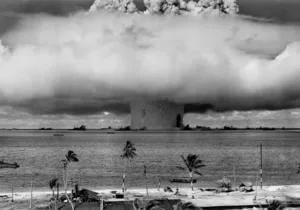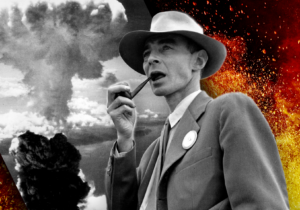The new Oppenheimer film isn’t shy about portraying the atomic bomb’s maestro’s intimacy with American communists. His wife and mistresses were or had been communists, along with other companions. The film and most conventional histories deny he himself was ever an actual party member, but in the 1930s he likely had been.
This information was known to the government. But Oppenheimer’s magnetic brilliance made him indispensable for the Manhattan Project. He believed in the imperative of American victory in World War II. And he did not betray his country. But he was reluctant to report others who did.
Oppenheimer’s sophisticated social circle of Communists and other pro-Soviet leftists recalls the magnetic pull of the USSR and of Marxism-Leninism on many, many smart people in the 1930s and 1940s. Their choices perplex us today. Wasn’t Stalin murdering millions in the 1930s? How could any decent person possibly sympathize with such a regime?
For Oppenheimer’s smart set, and for many others, the Soviets offered, at least from afar, a vision of justice that seemed elusive in Depression-era Western capitalist economies. Capitalism seemed to be self-destructing while the Soviet Union offered cohesion and confidence, if drenched in blood. That the Soviets, at least initially, opposed Naziism and the Axis powers, while the West appeased, also added to their luster. Many communists in the West awoke from their delusions after Stalin’s pact with Hitler, which launched WWII. But the German invasion of the Soviet Union reignited old sympathies. Some Americans and others who leaked atomic secrets to the Soviets believed America’s allies had a right to such technology. Afterall, the Soviets were bearing the brunt of Nazi fury. America was collaborating atomically with the British, they reasoned, so why not the Soviets?
The American and other Western communists of the 1930s and 1940s of course are without excuse. They were seduced by a murderous great evil. Their willful naivete was sinful and disastrous. The spies who leaked the atomic secrets to the Soviets were especially reprehensible. With such information, the Soviets could potentially have killed millions of Americans and others. (Some pro-Soviet spies ludicrously rationalized that a world with two nuclear armed powers was more stable than just one hegemon.)
The Western communists of 80 years ago were not unusual in the sense that every society in every era has very smart people who succumb to absurd and even wicked fads. Intelligence is no guarantee of good judgement and good ethics. Intellectuals are especially prone to utopian schemes that absolutize what intellectuals want and that empower the right intellectuals over the less enlightened.
But intellectuals are not alone in their susceptibility to faddish insanity. While Oppenheimer’s intimates were fawning over the USSR, many regular Americans in the millions were listening to pro-fascist radio priest Father Coughlin, heeding populist demagogue Huey Long, reading Henry Ford’s anti-Semitic mass circulation newspaper, or admiring the subtler intrigues of Charles Lindbergh. People of all classes and education levels can have bad judgment, surrender to darker instincts, and just lose their minds. Fortunately, more often than not, Americans tend to wonder back to the American creed of human equality and liberty that makes our country exceptional. As Churchill during this time half joked, America ultimately will do what is right after trying everything else.
Oppenheimer incarnated the best of America in rallying the world’s greatest minds to the Manhattan Project, employing tens of thousands of employees in enormous secret facilities across the nation at the cost of what today would be hundreds of billions of dollars. He and the others were motivated by fears that Nazi Germany might gain atomic weapons first. Fortunately, what made the Third Reich evil also ensured its demise. Many of its greatest scientists were Jewish, like Albert Einstein, and they fled, sharing their abundant brilliance with democratic and still basically decent America, which alone could lead the Allies to victory over the Axis. The bomb could only be justified if in the right hands, for moral purposes.
Oppenheimer was not conventionally religious, but he was deeply concerned about morality, which, combined with ego, drove him forward towards success. In the film, he denies later charges of communist sympathies, insisting he is a pro-FDR New Dealer. Communists despised the New Deal for trying to reform what they thought must be destroyed through revolution.
FDR does not appear in the film but his spirit looms over it. It was he, after receiving Einstein’s warning about Nazi Germany’s potential atomic weapon acquisition, who launched the Manhattan Project. FDR did not live to see the atomic bomb, but he was, perhaps even more than Oppenheimer, its father.
Famously, always secretive FDR never told his new vice president about the bomb. Truman appears in the film unfavorably, mocking Oppenheimer for his guilt over the bomb. This portrayal is somewhat unfair, but no doubt Truman did not appreciate the scientist’s tardy remorse. Truman always claimed to have none. A practical politician, Truman did not relate to Oppenheimer’s aethereal reflections. Not shown in the film, Truman abhorred the bomb’s destruction of non-combatants and quickly stopped any thoughts of a third atomic strike when the Japanese seemed on the verge of surrender.
Much of the film focuses on the Cold War in the 1950s, when Oppenheimer opposes further nuclear weaponry. Suspicious of his zeal against the Axis but relative ambivalence towards the now nuclear-armed Soviets, critics questioned his own views towards communism. The revocation of his security clearance, based on past associations with pro-Soviet communists, is shown as unfair. And maybe it was. But Oppenheimer’s bad judgment, and the even more horrible judgment of his pro-Soviet intimates, evinces every society’s dilemma.
Very smart people, no less than regular people, can become wickedly insane in their political judgments. Fortunately, during WWII, and the Cold War, America’s better instincts ultimately prevailed. We can pray it will long be so. But the darker impulses never go away, from which only divine grace can save.







 Sponsor a student for Christianity & National Security 2024
Sponsor a student for Christianity & National Security 2024